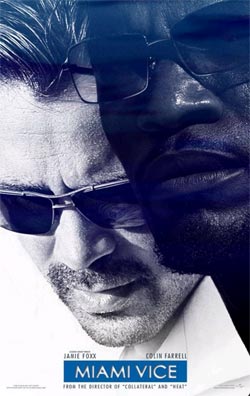 |
Miami Vice (2006, Dir. Michael Mann)
"There's undercover, and then there's 'Which way is up'?"
-- Det. Ricardo Tibbs, Miami Vice
Appreciating a Michael Mann film means accepting several pre-conditions: a willingness to put up with muscle-bound storytelling that teeters at the border between formula and cliché; a predilection for immaculately starched suits; and a tolerance for macho codes of conduct that suggest David Mamet, if Mamet dealt with images instead of words (all of the above set to eclectic soundtracks piped in from some space-age bachelor pad of the damned). As easy as it is for all this to tip over into parody, we are fortunate that Mann the filmmaker is every bit as stylish and striking as Mann the auteur is overwrought and overdetermined. One can harp on the similarities of Mann's Heat and Collateral, and dismiss them as tough-guy trash dressed up in silk suits, for example, but that would be underestimating the skill that he brings to less patently Mann-ful projects such as Manhunter, The Last of the Mohicans, and The Insider.
Although he's restated his pet themes and motifs throughout his career, Mann has never come close to outright recycling -- until now, with the release of the Miami Vice movie. Or has he? Critics and audiences don't seem to think so, and for those with fond memories of Don Johnson and Philip Michael Thomas, that has been a rude awakening. The common complaint has been that apart from the names of our two favorite detectives, there seems to be nothing here that recalls the halcyon days of the Miami Vice television series two decades before, when coolness was equated with five o'clock stubble and wearing loafers without socks. Gone are the pastels, the tumbling opening shots of waves and bikinis in broad sunlight, the sense of trashy fun that barely masked the darkness that was always at the heart of the show. And yet, Mann's film is Miami Vice through and through -- it is Miami Vice recapitulated, with its ripe sun-tanned skin peeled off, exposing the raw nerves and desolation underneath. The who-gives-a-damn existentialism and consumer fetishism of the Reagan era have given way to the gritted teeth and we-got-a-job-to-do professionalism of Bush the Younger. One can imagine Don Johnson's Sonny Crockett dreaming this movie whilst in the fever grip of a particularly vicious hit of coke.
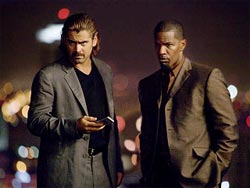 |
In its broad outlines, this
Miami Vice is a note-for-note cover of the original song. Dade County detectives Crockett (Colin Farrell) and Ricardo Tubbs (Jamie Foxx) are pulled into an FBI investigation, and volunteer to go undercover to expose a multinational drug smuggling operation. Posing as drug runners, they burrow all the way to the source, crime lord Arcángel Jésus de Montoya (Luis Tosar), and in the process get to show off a lot of gleaming automatic weaponry, "go-fast" boats, and the latest designer fashions. Naturally, complications arise when Crockett is smitten with Montoya's mistress, Isabella (Gong Li), who for no discernible reason is a Chinese immigrant from Cuba. Throw in a loose-cannon group of white supremacists (very '80s, huh?), the usual smattering of cinematic rock tunes (including a wretched cover of Phil Collins' immortal "In the Air Tonight" by Nonpoint), and a big shootout to wrap everything up, and you would think everyone walks home happy.
From the start, though, it is clear that Mann is pushing the conceit of undercover cops to its logical extreme -- divested of anything resembling personality or camaraderie, Farrell and Foxx are presented (and filmed) as grim, nomadic warriors, preferring to hold conversations in jargon (keep count of how many times "op-sec" is mentioned), or joust with drug lords in the mine-is-bigger-than-yours vernacular that has been the lifeblood of countless crime flicks. It's romantic all right, as long as you consider the natural end of every romance to include bullets to the brain. Likewise, a decidedly nocturnal Miami has been drained of color and sun; as framed by Dio Beebe's remarkable digital videography, the city is a mass of angles and mazes, skyscraper surfaces looming like abstract art, waterways and canals spreading out in the night like diseased veins. Mann takes it a perverse step further by setting most of the action outside Miami, as our heroes trace the drug smuggling ring to Colombia, an odyssey that leads to a luxurious hideaway perched near the edge of Iguazu Falls, treating us to shots of billowing clouds and sleek jets, as well as the filth and grime of Latin American streets. It's epic, it's gritty, but it's not pastel.
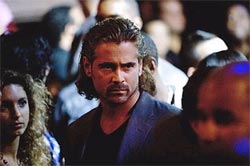 |
Miami Vice is an enthralling visual spectacle -- Mann couldn't make a drab movie if he tried -- and say what you will of his inflated view of his heroes and their mission, but few directors can romanticize the world of thieves, murderers, informers, and good guys with as much bite. The film's high points are what you would expect from the director of
Heat and
Collateral: a standoff in a trailer park that climaxes with an execution that plays like a punchline; those sweeping shots of boats and planes and sportscars burning across the screen; the effortless panoramas of characters and locations juxtaposed with the sweaty, intimate close-ups of busts and conspiracies gone awry. In stark contrast to the other purveyors of violence who clog our cinemas today, Mann also knows when to pump up the volume and when to ease up on the throttle. Apart from some splattery kill shots to the head ("Jackson Pollock," Foxx muses), a strange delicacy permeates the film. When a man commits suicide by walking into traffic, we don't see the moment of impact, or the gore -- we merely see a demure streak of red on the pavement. Even the final gun battle, which would be a riot of sound design in most Hollywood actioners, is presented as hushed, distant, like muffled thunder, the sounds of the guns like little
pops. Mann may be the true descendant of Peckinpah and Penn -- to all of them, violence is not to be shied away from, but its impact is heightened through artistic rather than technical means.
And yet, as
Miami Vice lumbers past the two-hour mark towards its inevitable conclusion, you might find yourself wondering what all the fuss is about. Certainly all the Mann-erisms are in place, but to what end?
Heat was a penultimate statement about the unspoken bonds between the hunter and the hunted, composed with razor-sharp exactitude amist a sprawling canvas of characters and episodes.
Collateral was like a jazz riff, as its near-parodic casting of Tom Cruise as a relentlessly self-improving assassin punctured the macho myth even as it reinforced it. But here, Mann is backtracking, content to play around on home turf without a compelling reason to do so. He does his actors no favors with his skeletal dialogue; Foxx does as well as he can with a nonexistent character, and he has developed quite a glower as he has matured as an actor, but doe-eyed Farrell, buried beneath his handlebar mustache and mullet, struggles to utter his lines without sounding robotic. As the criminal mastermind Montoya, Luis Tosar makes understated menace seem almost charming, even as Mann goes overboard with the ostentatious displays of wealth and power, as if he was remaking Brian DePalma's
Scarface, while John Ortiz is equal parts jitter and calculation as Montoya's right-hand man Yero. The rest of the supporting cast is completely unmemorable, including Naomi Harris as Tubbs's girlfriend, whose sole function seems to be showing off her curves (or perhaps it's her stunt double's curves) in a sex scene straight out of a music video, or getting kidnapped at the wrong moment. The rest of Crockett and Tubbs' team are inconsequential specters; blink and you'll miss the talented Justin Theroux as Zito (
Vice-heads will sigh: Whither Lieutenant Castillo?).
Constrained by network standards and other limitations, Miami Vice the television series was no great character study, either, but there was no doubt of its intent. Hardly revolutionary (we've had cop stories with downer endings since at least Kojak), it nevertheless reintroduced us to the pleasures of French New Wave, dressed up with an 80s sense of visual design and a sharper cutting style. Nothing in the movie comes close to matching the terse shorthand of the silent (and justifiably famous) scene in the original TV pilot: Crockett and Tubbs, both seized with the lust for vengeance, motor towards a final showdown, staring straight ahead, the pulsing shots of lighted streets and their convertible sports car intermingling with the strains of "In the Air Tonight" and providing more context and poetry than dozens of pages of hackneyed cop dialogue. In contrast, the film Miami Vice is like a zen koan shot through the barrel of an automatic rifle -- elegant and pitiless and monolithic.
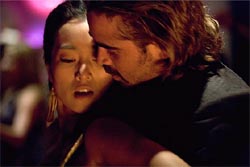 |
Yet no matter how much Mann tries to toughen up his material with this remake, there's no denying the essential drippiness at the heart of his macho project -- the idea that a toughened professional can be vulnerable to the wiles of a woman, and be tempted by the prospect of a good old heterosexual relationship. It was the the one facet of
Heat that was off-key (can anyone imagine Robert DeNiro wanting anything apart from a heist well done?), and Mann recycles it as the ostensible emotional center of this film, with laughable results. ("This has no future," Crockett soulfully reminds Isabella -- and us.) And yet, even though the Crockett-Isabella romance is easily the least convincing thing in the movie, its very messiness is the only thing this cold, immaculate film has that resembles life. Gong, speaking half-intelligible English, trots out the facial tics she honed working with Zhang Yimou -- the curled lip, the defiant jut of the chin and tip of the head, the little-girl smiles that break out at surprising moments. Her performance isn't what you would call great acting, but it's impossible to ignore, and even Farrell seems charmingly abashed in her presence. When the ever-gallant and always-horny Crockett casually invites Isabella on a speedboat ride across the Florida Straits to Cuba for a mojito,
Miami Vice the movie succumbs to the smarmy, high-consumption charms of
Miami Vice the television series -- and is the better for it. The wordless, sun-drenched shots of the two would-be lovers cruising the endless sea, perched between languor and lust, are like a refreshing blast of spray to the face, and remind us that sometimes the glamored-up version of illicit activity has more of a kick than the real thing.



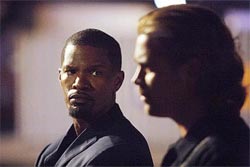



0 Comments:
Post a Comment
<< Home